Lackluster Support for Ridwan Kamil in Jakarta
Ridwan Kamil’s electability remains stagnant in the Jakarta regional head election. His supporting parties are not actively campaigning for him, leaving him hoping for support from Prabowo and Jokowi.
maaf email atau password anda salah

Ridwan Kamil’s electability remains stagnant in the Jakarta regional head election. His supporting parties are not actively campaigning for him, leaving him hoping for support from Prabowo and Jokowi.
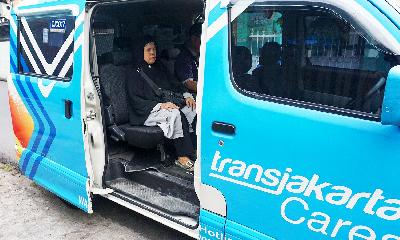
Jakarta's regulations were considered as failing to fulfill the aspirations of differently-abled people
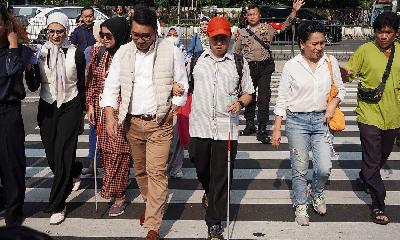
Jakarta governor and deputy governor candidates promise improvements in inclusive public transportation.

Gubernatorial candidates are trying to win over the votes of Anies Baswedan supporters in the Jakarta regional election. Jokowi reportedly shifted his support.

Pramono Anung and Ridwan Kamil shed light on the dynamics surrounding their appointments as Jakarta gubernatorial candidates.

The PDI-P canceled its plan to nominate Anies Baswedan for the Jakarta gubernatorial election. Pressure came in the form of legal cases and revisions to the MD3 Law.
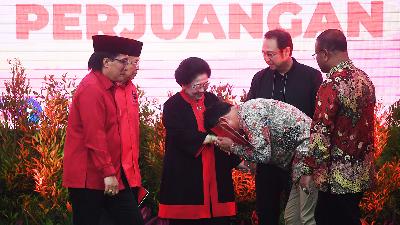
The PDI-P will be nominating Anies Baswedan in the Jakarta gubernatorial election. A popular candidate against Jokowi’s coalition.

The opportunity for Anies Baswedan to contest the Jakarta gubernatorial election is slipping away after the coalition of parties supporting him fell apart. There is a guerrilla from the Palace.

An exclusive Tempo interview with Anies Baswedan regarding his chances to run in the Jakarta regional head election.

Jokowi and Prabowo’s coalition are maneuvering to thwart Anies Baswedan’s candidacy in the Jakarta regional head election. Cabinet posts are being offered as inducements.

Chances for Anies Baswedan to run in the Jakarta regional head election are beginning to open up. A number of political parties support Prabowo Subianto intend to nominate Anies.

President Jokowi is plotting for his youngest son to run for the deputy governor of Jakarta. This is a repeat of the presidential election.

Jokowi allegedly tries to thwart Anies Baswedan’s candidacy in the Jakarta gubernatorial election. There are efforts to include Kaesang in the 2024 regional head elections.
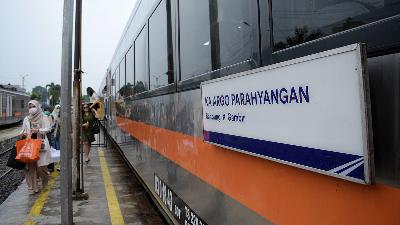
The Jakarta-Bandung high-speed train is considered less competitive than the Argo Parahyangan regular train service. The company is working to boost its non-passenger revenue.

The Jakarta-Surabaya high-speed train will disrupt other modes of transportation. Tariffs would depend on the investment value.

China and Indonesia have begun an assessment of the Jakarta-Surabaya high-speed train. The project would add to the Belt and Road Initiative’s achievements.
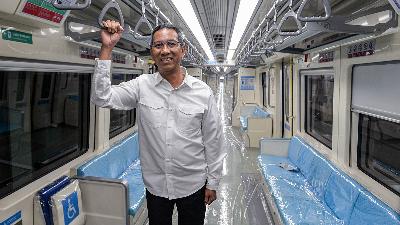
Acting Jakarta Governor, Heru Budi Hartono, on pollution and the future of Jakarta after it is no longer the capital city.
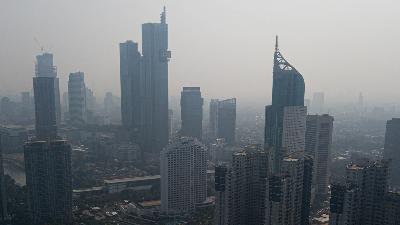
The government is scrambling to deal with air pollution in the greater Jakarta area. They set policies while using old data.
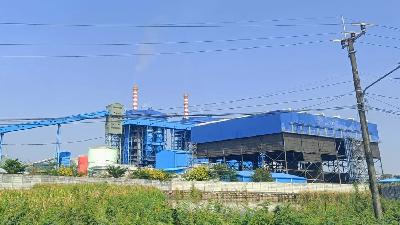
Jakarta’s pollution is also caused by coal-fired steam power plants and industries. The government only focuses on emission tests and traffic engineering.
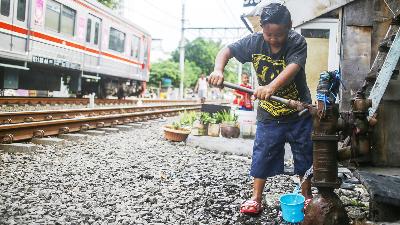
Excessive extraction of groundwater has been the greatest contributor to Jakarta’s land subsidence. The construction of drinking water pipes will be accelerated.

A Jakarta public transportation user’s letter to interim Jakarta Governor Heru Budi Hartono and Supreme Court Justice Takdir Rahmadi’s right of reply.

A letter suggesting Oakland’s concept for building an environmental-friendly Jakarta.

Readers’ letters about an access road plan around the Jakarta Governor’s private residence and the exemplary deeds of Hoegeng, Hatta, Gus Dur and Habibie.

It is pointless for the government to deny Jakarta’s air is once again heavily polluted. Denial will only gives people a false sense of security.
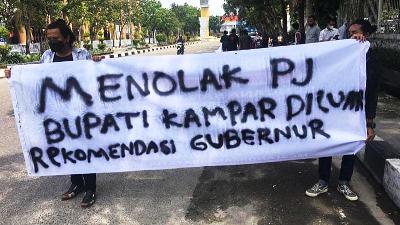
Some governors question the appointment of acting regional heads by Jakarta. Maneuvering in the regions, and complaining to political parties.

The massive construction of infiltration wells in Jakarta to prevent floods is almost a waste of money. The Jakarta administration should focus on restoring the functions of rivers and reservoirs instead.
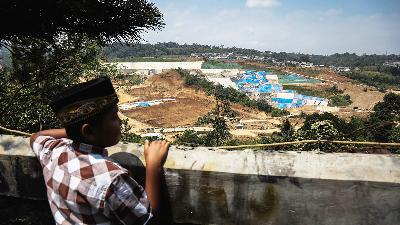
Jakarta’s perennial flooding problem will be controlled using a system of massive water containment. Infiltration wells are deemed unsuitable for the soil characteristics of the city.
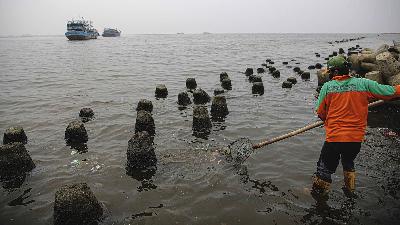
BRIN researchers discover concentrations of pain and cold relief medicine pollution in the Jakarta Bay. This acetaminophen waste is known to have an impact on shellfish, but its effects on humans are yet to be determined.

Greenpeace predicts that Jakarta would be inundated in 10 years. The government must save the capital, not abandon it.
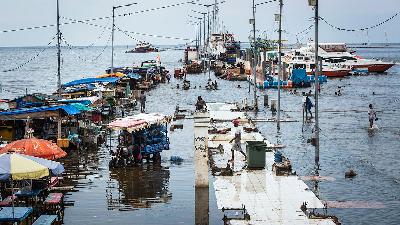
The latest Greenpeace study warned about the impact of the rise in sea levels on Jakarta’s flooding by 2030. A more progressive strategy in lowering carbon dioxide emissions is imperative.
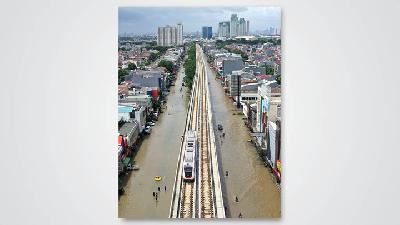
JAKARTA flooding is nothing new.

The large scale cutting down of trees in Jakarta must be stopped. Economic development needs an ecological perspective.

FOR the third time, the Vatican has chosen an Indonesian archbishop to be Cardinal of the Roman Catholic Church. On October 5, last year, Jakarta Archbishop Monsignor Ignatius Suharyo Hardjoatmodjo was installed by the head of the Holy See Pope Francis as one of the 13 new cardinals or ‘princes’ of the Church.

The central government and the regional administration are busy accusing each other to the cause of the floods that inundated Jakarta. Weak public service management occurred at all levels.

SEVERAL coastal zones in Indonesia, including Jakarta, Semarang and Demak, face the threat of disappearing because of rising sea levels and subsiding land.
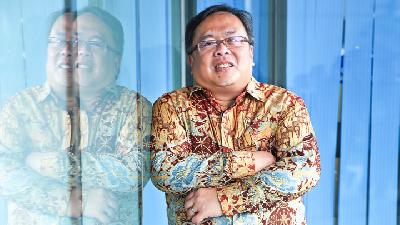
A mid severe floods that saw parts of Jakarta submerged at the end of April, President Joko Widodo rekindled the plan to move the capital city.
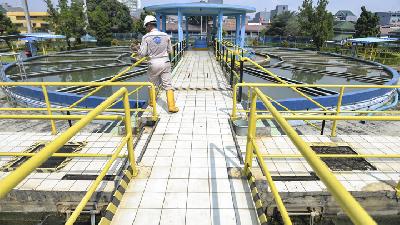
Jakarta government decides to take over clean water management in the city. They have met with Salim Group, private operator for Jakarta water management.

A report that South Korean citizens were extorted by Jakarta police must be followed up. This kind of deplorable behavior tarnishes the reputation of law enforcement.

Dozens of invaluable items at the Jakarta Maritime Museum were destroyed in a fire. The building is no longer in appropriate condition for a maritime museum.

Developers working on the Jakarta Bay’s reclamation are lobbying Jakarta’s new governor, Anies Baswedan, to resume the project. Anies is yet to make his position clear.

On Friday, June 9, Adolf Heuken and Tempo magazine took a stroll along old buildings in the Harmoni vicinity all the way to Kota Tua, or Jakarta old's town. Heuken remembered details of the buildings' histories with astonishing accuracy. He easily recalled the year the Portuguese Church--known as the Sion Church--was built, and how old the clock in its yard is. It had been a while since his last visit to Kota Tua, and Heuken was sorely disappointed to find the deteriorated condition of several buildings. Some, he noted, had even disappeared.

Reclamation of Jakarta Bay can potentially damage the city's northern coastal environment. So why is the city government issuing a license for its development?

Twice a week, Alfred Sitorus rides his bicycle from Depok, West Java, to his office at the Sarinah complex in Central Jakarta. It takes around two hours for him to cover the distance of 25 kilometers, but he is determined to stick to the routine. "The dirt is clearly visible when I wipe my face with tissue or a wet cloth," said Alfred, chairman of the Coalition of Indonesian Pedestrians, last week.

ITALIAN Navy multirole frigate, ITS Carabiniere, visited Jakarta last week. With 180 crews on board, the warship set sail from La Spezia, Italy, on December 20 and has visited Saudi Arabia and Australia.

Campaigns for the election of regional chief executives in the past three months have exposed the dirty side of democracy. Most candidates running for office this Wednesday have fallen into the trap of debating primordial issues, instead of proposing anything substantive.
Meanwhile their supporters, particularly in Jakarta, have even been using religious and racial sentiment in their campaigns. News reports attacking candidates have appeared in social media. Fake news has spread widely. This show of hatred, which endangers social harmony, has been served up in the most brutal fashion.

The on-going battle in the virtual world between the campaign teams of candidates running for Jakarta governor has become fierce and more explicit.

Investigation by the KPK into the role of Sunny Tanuwidjaja in the Jakarta Bay reclamation scandal is expected to reveal the extent of middlemen's role in our chaotic bureaucracy.

The government and Jakarta Governor Basuki Tjahaja Purnama should take advantage of the Island G status quo to reexamine all the regulations concerning the reclamation of Jakarta Bay. The ruling will cause many problems if the Jakarta government does not immediately resolve this legal dispute.
Governor Basuki must immediately lodge an appeal against the ruling so the judicial process goes on to the Supreme Court. A binding decision must be forthcoming so there is legal certainty for Agung Podomoro, the owner of Island G, and for the people who bought land on it.

BASUKI Tjahaja Purnama has been dragged into a whirlpool of bribery charges by reclamation developers over his decision to impose additional contributions to the local government without any legal basis. The Jakarta governor claims it was his discretion to set the additional contributions necessary for accelerated development.
He said the requirement for the additional contributions as a precondition for issuing the reclamation permits was not bartering. "A barter would be if I benefited from it," he declared. Refusing to be specifically interviewed on this, Basuki was willing only to answer the questions submitted by Tempo reporters Ananda Teresia and Erwan Hermawan at two different opportunities on Wednesday and Thursday last week.

FIVE Hino trucks plied back and forth on Island D as 10 construction workers prepared to enter the North Jakarta coastal area last Wednesday afternoon. A security guard stood by a bridge leading to the Pantai Indah Kapuk housing complex to check the workers' tool kits.
Activities on the 312-hectare island, managed by Kapuk Naga Indah, continued apace despite Jakarta Governor Basuki 'Ahok' Tjahaja Purnama's order that they be stopped pending the issuance of building permits. "We've already sealed off the area," Ahok claimed.

It is not enough for the shophouses built by Kapuk Naga Indah company on Island D to be sealed off. They had begun to be sold, without ever holding building permits. Their exclusive right to continue building should be revoked.
Furthermore, Kapuk Naga's parent company Agung Sedayu is now being investigated for allegedly bribing Mohamad Sanusi, a Jakarta City Council (DPRD) member. The owner of the property company had objected to a 15-percent contribution in the proposed bylaw on the Land Use Plan for the North Jakarta Shoreline Strategic Area. He paid Sanusi to have it removed.

According to Governor Basuki, or better known as Ahok, the audit of the Supreme Audit Agency (BPK) on the 2014 finances of the Jakarta administration was full of holes. He claims the audit was carried out to undermine his credibility. Last week, Ahok sat with Tempo to share his annoyance at the fuss over the Sumber Waras land deal.

A one-on-one meeting between Bandung Mayor Ridwan Kamil and businessman Sandiaga Salahudin Uno took place on January 31 under the media's radar. Oddly enough, no one was aware of the mayor's agenda that day. The two met at the mayor's official weekend residence. During the meeting that lasted an hour-and-a-half, the two men talked about the plan to modernize 37 traditional markets in Bandung.
Just before the call to prayer at sunset, however, Sandiaga brought up the topic of the election for the next Jakarta governor. As the meeting was coming to an end, he asked Ridwan abouthis readiness to be a candidate. Ridwan said he would think about it. "In that case, I'll start (campaign) activities before you in Jakarta," Sandiaga said. Last Thursday, Ridwan dismissed the news that their meeting had been specifically to discuss the election. "It's only about investing in the markets," he said.

ONE hundred and six members of the Jakarta Provincial Legislative Council (DPRD) seemed pleased when their four demands were granted. In the 2016 Jakarta Regional Administrative Budget (APBD), four components in the council's expense budget were significantly increased. These include budgets for travel and recesses, new meeting tables and chairs and new laptops.
The budget for travel expenses, for instance, was raised from Rp430 thousand to Rp1.5 million. Jakarta DPRD Deputy Chairman Muhammad Taufik, a Great Indonesia Movement (Gerindra) Party politician, said it had been twelve years since the travel budget was last increased. "We often had to cover the excess," he said.

JAPANESE and Chinese investors are competing to be chosen to build the Jakarta-Bandung bullet train project. The train would be able to travel up to 300 kilometers per hour.

After living under five different governors, residents of Jakarta's Kampung Pulo who built homes on the banks of the Ciliwung River will be relocated and their homes demolished. The government plans to widen the river at that particular area so the 3,000 families living around the area are not flooded everytime the rainy season comes around.

After nine months of negotiations and three surveys, the Broadway Entertainment Group is ready to stage Beauty and the Beast in Jakarta. The musical drama, derived from the Disney animation film, will be staged from May 26 to June 27 at the Ciputra Artpreneur Theater in Ciputra World I, Mega Kuningan, South Jakarta.

THE public is tired of watching the feud between Jakarta Governor Basuki Tjahaja Purnama and members of the Jakarta Provincial Legislative Council (DPRD). The 2015 Regional Budget (APBD) has still not been decreed as a regional regulation because of the crisis between the two parties. As a result, Rp73.08 trillion of funds cannot be disbursed. A number of development projects are stuck and employee benefits have not been paid for the two months.
Of the 1,328 respondents that joined last week's Tempo poll, 63.1 percent agreed the government could use the 2014 Regional Budget instead. However, doing so would create complications, because not all the programs outlined in the 2015 budget were budgeted last year. For example, in the 2015 budget plan, funds allocated for Jakarta civil-servant allowances amount to Rp10.8 trillion, or 16.09 percent of the total budget. In the 2014 budget, such funds are drastically reduced.

AT the end of February, Jakarta Governor Basuki Tjahaja Purnama dropped off a bundle of documents at the Corruption Eradication Commission (KPK) headquarters. Inside was information on a number of procurement projects in the 2014 and 2015 Regional Budget (APBD) that Basuki suspected of being marred by 'phantom programs'. "The phantom budget hiding in the 2015 APBD comes out to around Rp12 trillion," he said.

After 28 years of diplomatic relations with Indonesia, Costa Rica will open an embassy in Jakarta. The plan was conveyed by Costa Rican Deputy Foreign Minister Alejandro Solano Ortiz to Foreign Minister Retno Marsudi in Jakarta on March 10, 2015. "Costa Rica has launched the 'trans-Pacific strategy' policy and Indonesia is an important spot in the region," he said.

THE four-story building is located just 50 meters from the Jakarta Regional House of Representatives (DPR) building in Central Jakarta. The white paint on the walls is peeling and the yard is a mess. Despite its dilapidated condition, this office building is the most important part in the unofficial budget added to the 2014 Jakarta Budget.
A Jakarta government official said that some companies in that old office building were awarded projects for uninterruptible power supply (UPS) equipment last year. "It is now known that some of the winners were just shell companies, rented out by others," said that official.

DID you know that there is a 900-square-meter river delta area in the middle of the Ciliwung River? The 109-kilometer long river, which runs from the foot of Mount Pangrango in Bogor to the Bay of Jakarta, is currently in very bad shape. It is polluted and its channel is getting increasingly narrow and shallow. Despite the river's dire conditions, though, various creatures live and survive in the river's delta located in Cilawet village, Depok, West Java.

During his campaign three years ago, Basuki Tjahaja Purnama- familiarly known as Ahok-promised that Jakarta would be free of floods and traffic congestion, if he was elected deputy governor of the capital city. Today, he is governor of Jakarta, but a flood-free Jakarta remains a distant dream.

Tucked away behind a house and a small unsuspecting laundry business in Duren Tiga, South Jakarta, is a dairy farm with 35 heads of cattle. Though barely noticeable from the road, the farm forms a unique element of Jakarta's history.

It was a long night for the occupants of the Jakarta Raya Drinking Water Company (PAM Jaya) headquarters in Central Jakarta, that second week of April 2012. As dawn approached, the executives of the company-the directors and senior managers-each stood their ground, after a seemingly unending debate.
"The bosses were quarantined on the second floor. None of them were allowed to go home," recalled Suhaimi, one of the PAM Jaya employees who was at the office that evening. He was a unionist. Alamsyah Panjaitan, expert staff to the PAM Jaya directors, confirmed the information. "They held meetings for several nights running," he added. Both were interviewed by Tempo in early June.

The Jakarta government is relaunching its Old Town restoration project, for the umpteenth time. Today's efforts will actively involve a consortium business people, led by financial expert Lin Che Wei and jababeka (property developers) boss, Setyono Djuandi Darmono. Will they succeed in transforming oud batavia from a sleazy neighborhood to a well-restored old town on a par with others in the world? or will it go by the wayside, as previous attempts under previous governors? tempo looks at the history of restoration efforts and the current ambitious project.

One cause of the devastating flooding in the capital lies beneath the Jakarta's surface-literally. There is no law regulating underground management.

Megawati has different ways of testing Jokowi, whose popularity is unparalleled. The PDI-P chairperson has signaled that she will not run again for the presidency, boosting the Jakarta governor's chances of nomination.

The Jakarta Governor approved the continuation of the monorail project. The new investors' financial competence remains unclear.

An investment firm with no more than Sin$435 in cash had hoped to buy Palyja shares. Meanwhile Jakarta deputy governor hopes regionally- owned enterprises will be able to manage the city's water supply.

The Google Street View project for Jakarta has begun. Will it violate citizens' privacy?

The Jakarta Bay floating gas terminal is not supplying enough gas to fuel Muara Karang and Tanjung Priok power plants, leading to blackouts. The terminal is marred by repeated technical hiccups and a lack of LNG supply.

Pluit has been hardest hit by the recent flooding in Jakarta. Land continues to subside, the dam area is increasingly narrow and shallow, and there is weak supervision of embankments and land use. The fate of Pluit hangs on the system of dams, embankments, and water pumps.

Candidates vying to be governor of Jakarta are spending massive amounts of money on their campaigns. Contributions also come in the form of goods and services.

Groups of men armed with swords, machetes and bamboo sticks have been attacking illegal motorcycle racers on the streets of Jakarta. A gang war has broken out, resulting in victims. Reportedly, members of the military are involved in this spate of violence.

In its eighth year, Java Jazz has featured quite a few Grammy award winners. The chemical bond between Jakarta and the jazz world is growing. stronger.

A poetic picture capturing father-daughter interactions with Jakarta's night-life as the backdrop.

Jakarta plans to build a sea embankment to follow in Holland’s footsteps. It will change the face of Jakarta Bay.

Ruang Rupa developed a form of arts based upon collaborative projects and research. Their works criticize Jakarta with humor.

The 2010-2030 Spatial Plan for DKI Jakarta still includes reclamation as part of the development plan for North Jakarta, although controversy over this issue continues. A series of environmental damages must be repaired first. A Citizens Coalition will also file a class action suit requesting revisions to the spatial plans for the region.

The period for the Jakarta Regional Spatial Master Plan for 2000-2010 will soon be coming to an end. However, until now, mid-2009, the Jakarta Regional House of Representatives (DPRD) has not yet received the 2010-2030 master plan from the Jakarta regional government as required by Law No. 26/2007 on City Planning. Despite the fact that according to the plan prepared by the Jakarta City Planning Agency, the master plan which covers Jakarta city planning for the next 20 years should already be under discussion by the DPRD. This means that the time accorded has already been exceeded leaving Jakarta in the precarious position of not having a new city plan in place before the period for the old master plan comes to an end.
The Governor of Jakarta, Fauzi Bowo, as well as an array of high-ranking regional officials in charge of city planning, say they are in the middle of finishing the master plan. “At present we have finished the zoning map which we have been trying to prepare at the same time as we have been preparing development plans,” said the head of the Jakarta City Planning Agency, Wiryatmoko.
According to head of the Jakarta City Development Planning Agency, Nurfakih Wiriawan, the contents of the 2010-2030 master plan still need to be explained to many parties. “We sincerely hope that the bill for the regional regulations for this can be finished this year. After that it can be discussed in the regional parliament,” he said.

The Jakarta Stock Exchange continues to set records in the Composite Share Price Index.

Religious life in Indonesia never seems to be immune from civil unrest. After the attack on the Ahmadiyyah sect last year, a mob recently burnt down the home of the founder of the Al-Qiyadah al-Islamiyah sect. The followers of Ahmad Moshaddeq, a Betawi or native Jakartan, who claims to be a prophet, are on the run. The Indonesian Ulama Council (MUI) condemns the sect as deviant. Is it true they can be convicted for their religious beliefs? What makes these new sects so appealing that youths become their followers?

Voters in Jakarta are more rational in making their choice. Jusuf Kalla and Sultan Hamengku Buwono X have minimal support.

ENVIRONMENTAL experts say that Jakarta is committing ecological suicide. The air quality in Indonesia’s capital city has become so bad that in 2006 the World Health Organization (WHO) warned that Jakarta had become the third most-polluted city in the world after Mexico City and Bangkok. In one year of living in Jakarta we only enjoy clean air for 22 days, 223 days of medium-quality air, 95 days breathing unhealthy air and four days of extremely unhealthy air. Around 80 percent of Jakarta’s air pollution is caused by vehicle exhaust emissions and 20 percent from industry.
During the massive floods last February, around 69 percent of the city was inundated. During a similar disaster in 2002, “only” around 25 percent was submerged. And during the dry season Jakarta runs short of water. It turns out that the ground level is sinking by 2-8 centimeters per year. According to the Indonesian Forum for the Environment (Walhi), seawater intrusion has already reached as far as the National Monument in Central Jakarta.
The largest cause for the slump in the quality of Jakarta’s environment is the increasing decline of open green space. As we know, open green space not only functions as the city’s lungs, but also as a buffer against all of the effects of environmental damage. This is truly regrettable because Jakarta once had a city administration plan that was very pro-environment, the 1965-1985 Jakarta Master Plan, which was also the city’s first master plan. Included in the design was the concept of a greenbelt which would be a part of open green space covering 37.2 percent of the city’s land area. Only around 10 percent of this open green space now remains.
In order to add some spice to the start of Jakarta Governor Fauzi Bowo’s term in office, in this issue Tempo is featuring a report on Jakarta’s city administration and green open spaces. We want to illustrate just how much Jakarta’s environment has changed—and for the negative. Some believe it is the time to halt this decline. One example is what is being done by residents such as Chaerudin at the Pesanggrahan River and Abdul Khodir in Condet (see Safeguarding Our Grandchildren’s Future). They are now enjoying a small slice of a greener Jakarta.

Young Achmad Aidit was introduced to politics in Jakarta where he changed his name to Dipa Nusantara (D.N.) Aidit, his better-known appellation.

Jakarta Green Monster’s activities bring luster to the Muara Angke and Rambut Island Wildlife Reserves.

Retired army generals complain of being fleeced out of billions of rupiah by political parties with promises of nomination as candidates for Jakarta Deputy Governor.

On Citamiang Hill, Puncak, they build resorts as luxurious as five-star hotels. The owners include former government officials, governors, businesspeople, and—most of all—generals. A Tempo investigation discovered that these getaways were constructed by breaking the rules. They ignored the fact that this area plays a special role in preventing floods in Jakarta.
If this situation is allowed to continue, the damage to Citamiang will result in increasingly severe flooding in the Indonesian capital. This matter has become very important in the run-up to the Jakarta gubernatorial election, which will take place in August. On their shoulders is the burden to reduce the factors which contribute to flooding in Jakarta. The following is a report of Tempo’s investigation on this hilly area called Puncak, where illegal bungalows spring up like wildflowers.

New malls are mushrooming. In Jakarta alone there are almost 100 new units.

Traffic jams in Jakarta are getting worse. Indonesias capital city needs a mass transportation system that is efficient and runs consistently.

THE State Electricity Company (PLN) stumbled again. An internal audit report conducted by the companys Internal Monitoring and Supervision Unit discovered two improper practices in the implementation of the Customer Information System (CIS) Project in Jakarta and Tangerang. The inappropriate practices include weak procedures and financial loss on the part of the state. Last week, the management of PLN discussed the results of the report with Tempos investigation team. Valued at Rp137 billion, the CIS Project was assignedwithout proper tender proceduresto PT Netway Utama. What is the background of this improper procedure?
Tempos investigation follows.

There is concern that the death of Basri Sangaji may lead to a gang war in the streets of Jakarta. Stronger laws are needed to prevent such occurrences.

Apartments and shopping malls are flooding Jakarta.

More than 1,000 hectares of mangrove forests were destroyed in Jakarta in the past four decades.

Old temples, mosques and churches are dotted across Jakarta, some retaining their original architecture, most having undergone imprudent renovation. TEMPO retraces the origins of Jakartas old houses of worship, examines the work of historian Adolf Heuken in the area, and draws attention to the need for better conservation programs.

The Jakarta city government is drafting a new regulation on air pollution, including a provision on indoor pollution.

The war is happening not only in Aceh: in Jakarta the governor has instructed that the comings and goings of all Acehnese in the capital city be monitored.

Five years have passed since Jakarta was rocked by riots, transforming the city into a frenzy of destruction and chaos. The Joint Fact Finding Team (TGPF) which investigated the tragedy recorded 1,200 deaths in various fires that swept the city, 8,500 buildings and motor vehicles either destroyed or damaged, and over 90 Chinese women and girls raped or sexually harassed. Now, five years later, an investigation initiated by TEMPO is uncovering new facts. Doctors and volunteers who have worked with those victims of rape speak of their continued suffering: one rape victim is now mentally ill, and others have given birth or chosen abortion. The TGPF's conclusions about mobs and riots are gaining ground. The tragic story of Jakarta in May 1998 did not occur naturally and unallied. A military officer has disclosed to TEMPO his disturbing account of events that had long weighed on his conscience. TEMPO interviews General Wiranto and Prabowo regarding that fateful afternoon, and reveals the recent findings of the TEMPO investigation team.

For a long time they swarmed together, begging and later handing over part of their earnings to bosses. Now already familiar with Jakarta, some even have bank deposits.

Each year Tempo chooses people believed to have most contributed to the advancement of Indonesian art and architecture. This year our choice went to those who have produced fresh ideas, breaking away from conventionality and rigidity. In architecture, in particular, a new criterion was added: environmental awareness. In the process of selection, the following names made the list as Tempo’s Artists of the Year 2007: Ugo Untoro, Deddy Mizwar, Zen Hae, Tri Rismaharini, Amran Nur, Romo Johannes M. Hammerle, and Laretna.
Independent journalism needs public support. By subscribing to Tempo, you will contribute to our ongoing efforts to produce accurate, in-depth and reliable information. We believe that you and everyone else can make all the right decisions if you receive correct and complete information. For this reason, since its establishment on March 6, 1971, Tempo has been and will always be committed to hard-hitting investigative journalism. For the public and the Republic.